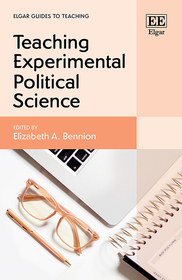
Teaching Experimental Political Science
Series: Elgar Guides to Teaching;
- Publisher's listprice GBP 108.00
-
51 597 Ft (49 140 Ft + 5% VAT)
The price is estimated because at the time of ordering we do not know what conversion rates will apply to HUF / product currency when the book arrives. In case HUF is weaker, the price increases slightly, in case HUF is stronger, the price goes lower slightly.
- Discount 20% (cc. 10 319 Ft off)
- Discounted price 41 278 Ft (39 312 Ft + 5% VAT)
Subcribe now and take benefit of a favourable price.
Subscribe
51 597 Ft

Availability
Estimated delivery time: In stock at the publisher, but not at Prospero's office. Delivery time approx. 3-5 weeks.
Not in stock at Prospero.
Why don't you give exact delivery time?
Delivery time is estimated on our previous experiences. We give estimations only, because we order from outside Hungary, and the delivery time mainly depends on how quickly the publisher supplies the book. Faster or slower deliveries both happen, but we do our best to supply as quickly as possible.
Product details:
- Publisher Edward Elgar Publishing
- Date of Publication 23 January 2024
- ISBN 9781802208788
- Binding Hardback
- No. of pages272 pages
- Size 234x156 mm
- Weight 542 g
- Language English 531
Categories
Long description:
This insightful book delivers a wealth of innovative ideas, models, examples, and advice for teaching experimental political science in the classroom and beyond, emphasising that teaching experimental research is necessary to prepare students to succeed as researchers, practitioners, active citizens and civic leaders. It illustrates how teaching experimental methods sparks students curiosity by allowing them to ask and answer questions about the world they live in.
With a core focus on successfully engaging a diverse range of students at all levels, this book includes a variety of approaches from contributing authors who are leading scholars in their field. Chapters provide both new and experienced teachers with concrete guidance on how to: facilitate student-designed survey experiments, use workbooks and templates to overcome mathematical and writing anxiety; use mock Institutional Review Board (IRB) reviews to teach students about the ethics of experimental research; follow an apprenticeship model to teach students to carry out their own lab experiments; and train students to go out into the field. Proposed models of teaching are supported throughout by the latest empirical research on the science of learning.
Teaching Experimental Political Science will be a key resource for faculty and staff working across a variety of educational contexts including political science, international relations, international politics, domestic politics, public administration and public policy.
The teacher-scholars featured in this book explain how to spark a students natural curiosity about the world they live in by using experimental design to test basic intuition, generate and answer “what if” questions, and address real world problems that matter deeply to students, researchers, policymakers, political practitioners, and the community at large.
‘The infectious enthusiasm with which the authors convey their teaching techniques and experiences draws the reader in, much as the hands-on pedagogy of experimental political science draws in students who might otherwise be reluctant to learn about research methods. Readers will find a wealth of innovative teaching ideas, but mainly they will be struck by the authors’ deep commitment to making political science research relevant and meaningful to students from all walks of life.’
Table of Contents:
Contents:
Introduction: innovative approaches to teaching experimental
methods in the political science classroom 1
Elizabeth A. Bennion
1 Experiments for all! Introducing freshmen to social
science research using innovative experiments 16
Debra Leiter and Beth Miller Vonnahme
2 Included and set up to succeed: an evidence-based
approach to teaching experiments in the diverse classroom 33
Elaine K. Denny and Reagan Bijou
3 Engaging students as researchers: the value of an
inquiry-based one-semester survey experiment 52
Jeffrey L. Bernstein
4 Using class-designed survey experiments to teach data
collection, analysis, and reporting protocols 66
Jennifer Bachner
5 Using templates to make survey experiments accessible to
math-anxious students 85
Eric Loepp
6 Nurturing problem-solvers: using workbooks to teach
experiments in international development 105
Lindsay R. Dolan
7 Incorporating experimental methods training into your
political science courses: a practical, topic-informed approach 124
Angie Bos and Bas van Doorn
8 From concept to implementation: engaging student
researchers in get-out-the-vote field experiments 137
Melissa R. Michelson and Mara Ostfeld
9 Train the trainer: a field experiment workshop for
graduate students and faculty 155
Elizabeth I. Dorssom
10 Teaching lab experiments using an apprenticeship model 177
Rose McDermott
11 Using mock institutional review boards to teach the ethics
of experimental research 194
Christopher B. Mann
12 When things go wrong in the lab: teaching new
experimenters to anticipate and adapt to the unexpected 212
Jonathan Rogers
13 Creating an experimental lab on your campus 226
Kim Fridkin, Manuel Gutierrez, Trudy Horsting, and
Alexandra M. Williams
Index




